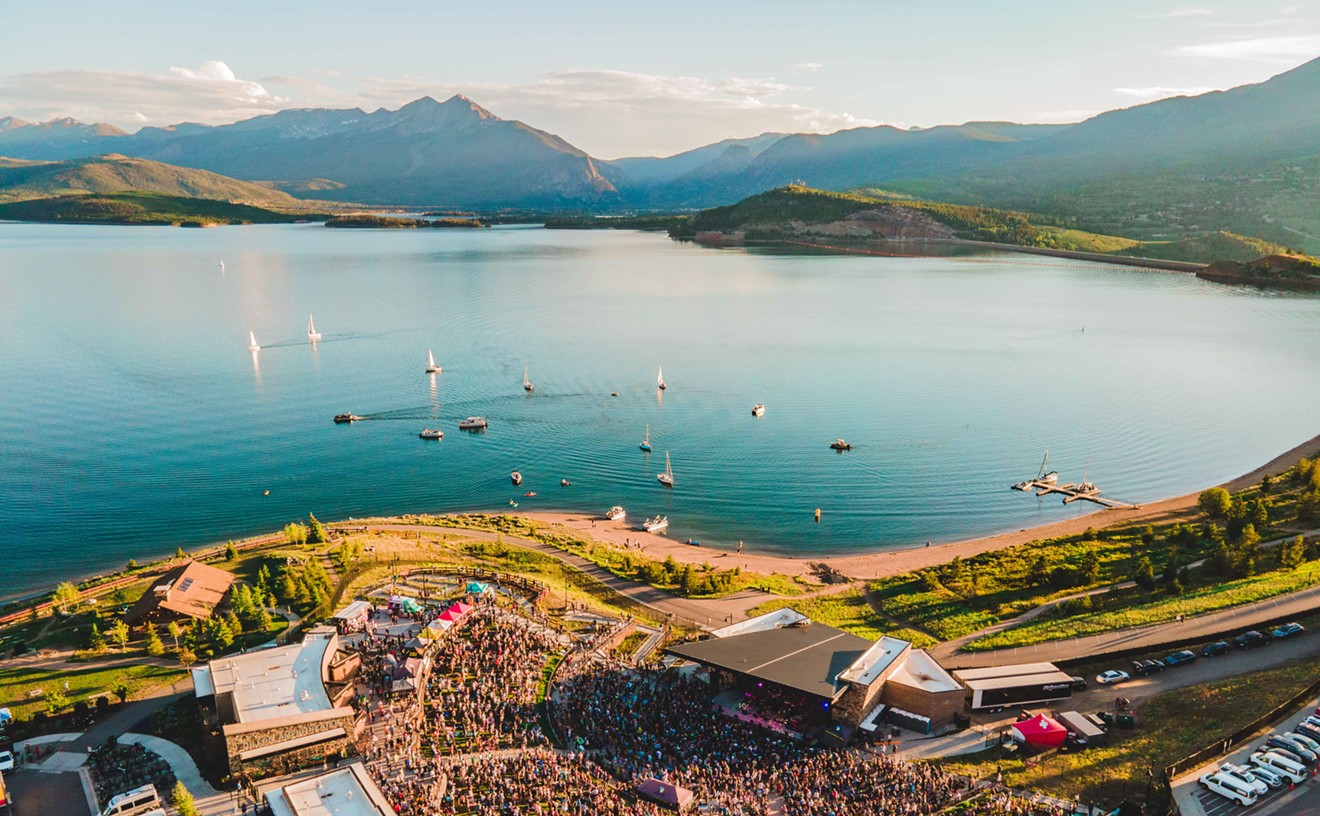Over the course of the next few weeks, Backbeat will be counting down the twenty most fabled moments in Denver music history. Today, a look back at when a Ray Charles concert at Red Rocks in 1962 turned into a beer-can-tossing melee.
With the passage of time, our heroes become more heroic, if docile. Exhibit A: Ray Charles. Long before he was the avuncular old gentle genius of showbiz, Charles was a touring pianist and singer playing gigs and packing venues. On one such night in 1962, a drunken mob nearly destroyed Red Rocks over the star's reportedly half-assed performance and chased his band off the stage.
See Also: • #20: Beatlemania at Red Rocks • #19: Michael Jackson's secretive stay in Denver • #18: Black Flag openers Nig-Heist get arrested for nudity 1984 • #17: Einsturzende Neubauten play '86 junkyard show • #16: Radiohead's gear gets jacked in 1995 • #15: Grateful Dead's first time at Red Rocks in 1978 • #14: Marc Cohn gets shot in downtown Denver, 2005
Concert-goers began showing up at Red Rocks around noon on August 21, even though the Ray Charles gig wasn't starting until 8 p.m. Absolute dead of summer. No A/C or shade. This was back in the venue's early days, when bottles and cans of 3.2 beer were cheap and plentiful. Apparently, folks were consuming a lot of it that day. Hours dragged on in the heat of the afternoon. As the crowd began to swell in the light of dusk, it became increasingly impatient for the music to start. Kids started climbing on the rocks and up the lighting rigs.
When the band appeared, there was no Ray. The singer was allegedly stuck in traffic on his way to the venue, and his orchestra was forced to play extended instrumentals while folks understandably began wondering what the hell was happening.
The beer bottles and cans rained down while audience members began chanting in a loud chorus, "WE WANT RAY!" A couple of musicians became scared and left the stage entirely. Charles, meanwhile, was just arriving at the venue, and, taking note of the crowd's increasing restlessness, said he wanted to cancel the show. The police were ho help; they were staffed with a force of just 25, ten of whom were just there to direct traffic.Some serious triage was in order. Local radio DJ Pogo Poge (born Morgan Branch White) from KIMN was emceeing the event. He did nothing to help matters, enraging the audience further by chastising them for their bad manners. A Denver Post article at the time described Poge, who died in 2010, as adopting a "high school principal" attitude toward the crowd. Things were getting serious. More bottles were thrown.
Ray was no stranger to drama. The year 1962 was a big one for the young singer: Atlantic Records had just released a two-volume anthology of his songs, titled The Ray Charles Story, he was supporting his first country album, Modern Sounds in Country & Western Music (which later was nominated for a Grammy), and he'd already garnered a number of awards, including Grammys for "Georgia on my Mind" and "Hit the Road, Jack." By the end of the year, Charles had made $2 million, but he was showing signs of stress.
Months before his ill-fated Red Rocks gig, police had discovered heroin in Charles's Indianapolis hotel room. He had been shooting up since he was a teenager in Seattle, but this was the first time that his addiction became a public affair. In true VH1: Behind the Music fashion, there were increasing concerns over his ability to handle the pressures of stardom.
Back in Morrison, promoters petitioned Charles to take the stage and Theatres and Arenas director Joe Salankey said that if the band didn't play on, Charles and his band would be responsible for refunding the audience's ticket money. The singer was in a tough spot: A couple of his musicians had been injured in similar crowd-agitating incidents at concerts in Indiana and Illinois. He didn't want to put them in any more danger.
This is when Charles's genius kicked in. He knew the drunks in the crowd would only become increasingly irate, and, seeing as how there was no stipulation in his contract for how long his band had to play, he decided to do a very abbreviated set. That way, he wouldn't have to refund folks' admission.
Thirteen songs and less than 45 minutes later, Charles and company were back off the stage. His set was, by all accounts, shoddy and ill-prepared, and after nine hours of waiting and drinking, the crowd was in no mood to play nice anymore. By the time the handful of officers calmed the crowd, no fewer than six fistfights had broken out among kids in the audience, and two full truckloads of garbage had been hurled on stage, including chairs that had been thrown after the band left. Eighteen people were treated for injuries.
A Rocky Mountain News review of the show was not too kind to Ray. "If Charles is going to offer fans abbreviated concerts," it reads, "he should develop a line of patter that will leave the crowds in a more pleasant frame of mind."
Follow Backbeat on Twitter: @westword_music










